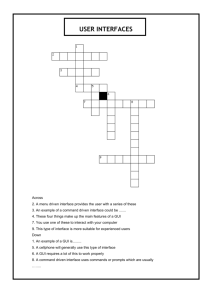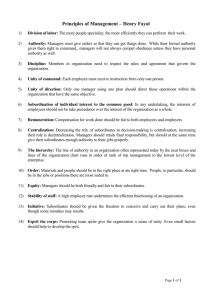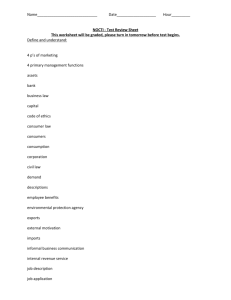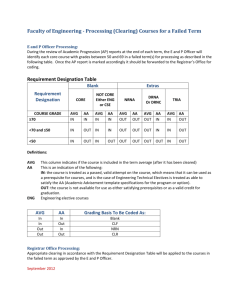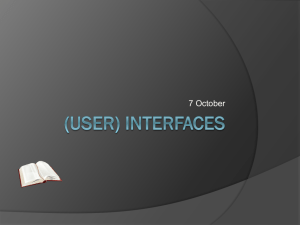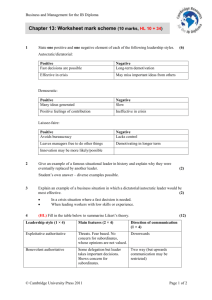Identification
advertisement
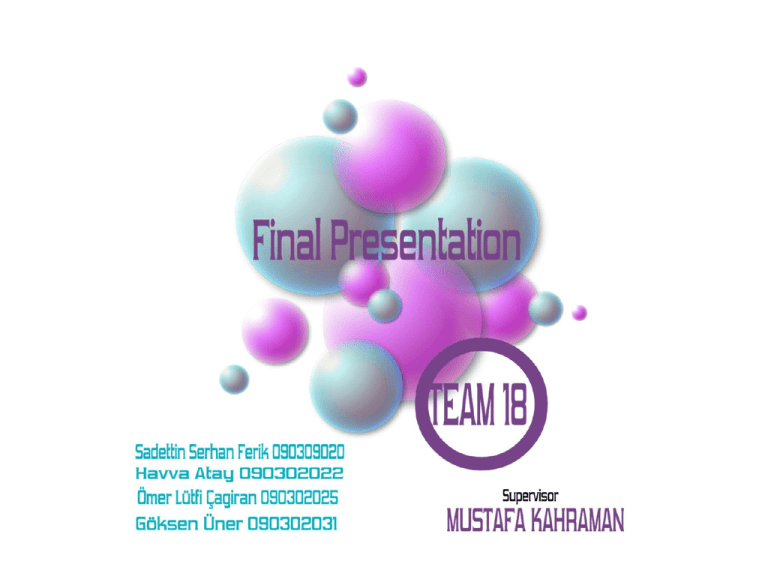
Outline
SPMP
SRS
SDD
Summary
Prototype
Software System Design Document
(General Summary)
Online Course Portal but we can say IOCP.
Using
Multimedia
Classification Technic (Bayesian)
System Overview
Online Course Portal is a WEB based application. The aim is to classify
the students according to their success and improve their
achievements. Bayesian theorem is used while doing these processes.
System Integration for User
Identification:
Login Module
Type
Process, GUI
Purpose
Send user to related page. Creating from
System Creator(us)
Function
User
enters
username
and
password,
system checks authentication and redirect
user to the corresponding page and giving
permission.
Subordinates
•
Admin
•
Student
•
Instructor
•
Guest User
Module Decomposition
Admin Module
Identification
Admin Module
Type
Process, GUI
Purpose
Having more permission than others and access
specific user and system information.
Function
Admin module provide Online Course Portal Structure
and Control Users Information
Subordinates
Password
Message
Accept/Reject Users
Content
Logout
Permission
Announcement
Some Instructure Module
Identification
List of student and grade
Type
Process, GUI
Purpose
Show classified student and grade
Function
Student will classification according to test,technic etc
and Instructor show list.
Subordinates
None
Identification
Content
Type
Process, GUI
Purpose
Course Education Documents
Function
Instructor can create, update, delete course content in
this module. Instructor created 4 part of document as
video, text, voice, picture and uploaded DB.
Subordinates
Identification
Homework
Type
Process, GUI
Purpose
Give Homework to student
Function
Instructor uploads /deletes / updates document in
course page and Instructor must give submission
date.
Subordinates
None
Add,Delete,Update
Student Module
Identification
View Content
Identificati
Type
Process, GUI
on
Purpose
Learning Education
Type
Process, GUI
Function
Before, student selected some course, Student show
Purpose
Learn successful
Function
After test result, System sends grade
course document and education only in related course
page. End of the content , Student direct test question
Show grade
result in show grade page and other
for first chapter. After some classification technic,
student average. Student show them.
continue related to content like video, picture, text or
voice according to student specific property.
Subordinates
None
Subordinat
es
Identificati
Identification
Solving Test
Type
Process, GUI
Purpose
Increasing Education Effective
Function
System Creator prepare different test. First chapter
applied mix question according to Course Content.
Subordinates
None
Logout
on
Type
Process, GUI
Purpose
Logout the Online Course Portal
Function
Instructors
can
logout
Directing main page.
Student direct class according to successful test and
specific property.
None
Subordinat
es
None
the
system.
Identification
Show Content
Type
Process, GUI
Purpose
Look page
Function
Guest look and show main structure, page in Portal
and only read some documents.
Subordinates
None
Content Management
System
Content Management System
Mysql DB on web based
Method Name DB Connection
Description
User Interface (Page) connection to DB and provide interaction
Share type
Public
Parameter
Mysql ,Php
Processing
<?php
$con = mysql_connect("localhost","root");
if (!$con)
{
die('Could not connect: ' . mysql_error());
}
mysql_select_db("ise491", $con);
mysql_close($con)
?>
Relational Database
Classification Technic
Naive Bayesian Classifier for IOCP
• Bayes Theorem takes important place in calculation of
probability. Making classification is possible basing on
Bayesian Theorem. Bayesian classifiers take place among
statistical classification techniques[1].
• After our users log in, firstly, in first chapter, they solve a
test. What is more, the test is divided to four different types
of questions. They are picture, video, voice, and text. For
example, the test consists of twenty questions:
•
•
•
•
The questions among from 1st to 5th are in type picture.
The questions among from 6th to 10th are in type text.
The questions among from 11st to 15th are in type video
The questions among from 16th to 20th are in type voice
St_id
Class
Age
Gender
St_avg
Test_avg
Content(type)
1
2
20
Female
2,30
75
Video
2
2
20
Female
2,20
70
Voice
3
2
20
Male
3,35
85
Text
4
4
23
Male
2,40
65
Picture
5
4
23
Male
2,90
80
Picture
6
1
19
Female
3,55
95
Video
7
1
19
Female
1,70
60
Text
8
1
20
Male
3,90
100
Video
9
3
22
Female
3,06
80
Voice
10
3
22
Female
2,30
70
Picture
11
4
23
Male
2,25
70
Text
12
2
21
Male
1,95
65
Video
13
3
23
Female
2,60
75
Voice
14
3
22
Female
2,50
70
Video
15
1
20
Female
2,10
70
Picture
In order to perform Bayesian Classification, Bayes probabilities of each hypothesis
are calculated.
C1 : Content = Picture
C2 : Content = Text
C3 : Content = Video
C4 : Content = Voice
•
•
•
•
•
•
•
•
•
•
•
•
•
•
•
•
•
•
•
•
•
In order to perform Bayesian Classification, Bayes
probabilities of each hypothesis are calculated.
C1 : Content = Picture
C2 : Content = Text
C3 : Content = Video
C4 : Content = Voice
It is necessary to calculate expressions below:
P(X | C1) * P(C1)
P(X | C2) * P(C2)
P(X | C3) * P(C3)
P(X | C4) * P(C4)
a) Calculating P(X | C1 ) * P(C1)
P(X1 | C1) = P(Class=2 | Content=Picture) = 0/4
P(X1 | C1) = P(Age=20 | Content= Picture) = 1/4
P(X1 | C1) = P(Gender=Female | Content= Picture) = 2/4
P(X1 | C1)=P(St_avg=2,30 | Content= Picture) = 1/4
P(X1 | C1)=P(Test_avg=100 | Content= Picture) = 0/4
P(X | C1) = P(X | Content=Picture) = 0/4 * 1/4 * 2/4 * 1/4 *
0/4 = 0
P(C1) = P(Content=Picture) = 4/15
As a result of all operations above;
P(X | C1) * P(C1) = 0 * 4/15 = 0
b) Calculating P(X | C2) * P(C2)
P(X1 | C2) = P(Class=2 | Content=Text) = 1/3
P(X1 | C2) = P(Age=20 | Content= Text) = 1/3
P(X1 | C2) = P(Gender=Female | Content= Text) = 1/3
P(X1 | C2)=P(St_avg=2,30 | Content= Text) = 0/3
P(X1 | C2)=P(Test_avg=100 | Content= Text) = 0/3
P(X | C2) = P(X | Content=Text) = 1/3 * 1/3 * 1/3 * 0/3 * 0/3
= 0
P(C2) = P(Content =Text) = 3/15As a result of all operations
above;
P(X | C2) * P(C2) = 0 * 3/15 = 0
•
•
•
•
•
•
•
•
•
•
•
•
c) Calculating P(X | C3) * P(C3)
P(X1 | C3) = P(Class=2 | Content=Video) = 2/5
P(X1 | C3) = P(Age=20 | Content=Video) = 2/5
P(X1 | C3) = P(Gender=Female | Content=Video) = 3/5
P(X1 | C3)=P(St_avg=2,30 | Content=Video) = 1/5
P(X1 | C3)=P(Test_avg=100 | Content=Video) = 1/5
P(X | C3) = P(X | Content=Video) = 2/5 * 2/5 * 3/5 * 1/5 * 1/5
= 12/3125
P(C3) = P(Content=Video) = 5/15
As a result of all operations above;
P(X | C3) * P(C3) = 12/3125 * 5/15 = 0.00128
d) Calculating P(X | C4) * P(C4)
P(X1 | C4) = P(Class=2 | Content=Voice) = 1/3
P(X1 | C4) = P(Age=20 | Content= Voice) = 1/3
P(X1 | C4) = P(Gender=Female | Content= Voice) = 3/3
P(X1 | C4)=P(St_avg=2,30 | Content= Voice) = 0/3
P(X1 | C4)=P(Test_avg=100 | Content= Voice) = 0/3
P(X | C4) = P(X | Content=Voice ) = 1/3 * 1/3 * 3/3 * 0/3 *
0/3 = 0
P(C4) = P(Content=Voice)=3/15
As a result of all operations above;
P(X | C4) * P(C4) = 0 * 3/15 = 0
e) Result
arg max{ (X | Ci) P(Ci)} = max{0, 0, 0.00128, 0} = 0.00128
Hence, It is clearly understood that the example which is
given belongs to content “Video”.
Final Data
Decomposition
and System
Referance
[1] Pressman, Roger S., Software Engineering, 4th edition, McGraw-Hill,
1997 S.86-Bayesian
[2]Fairley, R. E., Workbreakdown Structure, Software Engineering Project
Management, IEEE CS Press, 1997
[3]Php and JS,Css codes get www.w3school.com
[4]Project content was created by SE346 lesson notes.A.Akca Okan
[5] Database information get Compe 341 Lecture notes.D.Mishra
Thank You for Listening
